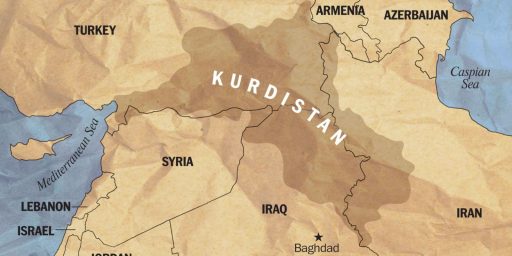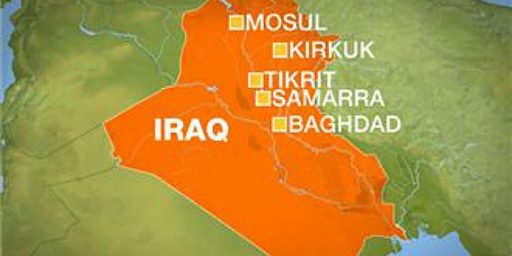Are We Overselling Iraqi Kurdistan?
I know, basically, nothing about Iraqi Kurdistan. I honestly doubt that Tom Barnett knows a great deal more.
I do know that the English language Iraqi Kurdish blogosphere is moribund. Its last gasps were complaints about suppression of press freedom in Iraqi Kurdistan. And I also know that there’s a different narrative about what’s going there than the one you’ve probably been hearing. In this contrasting narrative Iraqi Kurdistan is not a burgeoning democracy but a highly traditional, clannish place in which, like in much of the rest of Iraq, tribal interests are highly influential if not dominant, characterizing the two “political parties” in Iraqi Kurdistan as actually tribes, each led by its traditional tribal leader.
I’ve been trying for some time to identify and buttonhole someone who actually has legitimate knowledge and expertise on Iraqi Kurdistan, particularly Kurdish politics, without much luck. Any suggestions?
I’m concerned that a major permanent U. S. military presence in Iraqi Kurdistan would tend to destabilize Turkey, not a particularly positive development. It would, however, put pressure on both Iran and Syria, which IMO would be a positive development.




I’m concerned that a major permanent U. S. military presence in Iraqi Kurdistan would tend to destabilize Turkey, not a particularly positive development.
Wish you’d explain. An Iraqi Kurdistan will tend to destabilize Turkey, whether we’re there or not. What are we going to *do* there, exactly? Shoot Kurds who cross the border either way? I think not.
Sure. The Turkish military is quite capable of dealing with cross-border incursions by Kurdish nationalists. Indeed, I recently read an interview with a Kurdish minister in the Iraqi government to exactly that effect. My guess is that the Turks would be more reluctant to deal with cross-border incursions by Kurdish nationalists who are being actively protected by American forces.
If we don’t protect Kurds from the Turks, I further speculate that we’ll wear out our welcome in Iraqi Kurdistan pretty quickly.
What will we do? If we’ve withdrawn our troops to Iraqi Kurdistan we’ll be on the horns of a dilemma: either protect the bases being used by Kurds for raids against the Turks (which will upset the Turks) or ignore Turkish retalitions (which will upset the Iraqi Kurds).
If we butt out of Iraqi Kurdistan, it would maintain the uneasy status quo but I think that’s better than the alternative.
I guess in burgeoning democracies, the right to vote and rule by law is only valid if your motivation is pure ideological power hunger, like here in the US.
The biggest problem with our current posture, i.e. clinging to Iraqi kurdistan like it was the last life preserver on the lusitania, is that we are being utterly hypocritical.
We supposedly are at “war” with terror. And with countries that support terror.
Unless of course we need them, then terrorists are just fine.
It’s the exact same “do as we say, not as we do” BS that has been the sum total of our foreign policy for the last 60 years at least.
My guess is that the Turks would be more reluctant to deal with cross-border incursions by Kurdish nationalists who are being actively protected by American forces.
Ah. But I don’t see us “actively protecting” them, in the sense of shooting any Turks. However, I think you’re right in that the mere presence of U.S. troops would make Turkey fearful of an incident.
I don’t have time to double-check this right now, but I think Bill Roggio and Michael Totten have posted a good deal about Iraqi Kurds.
I like and respect Bill Roggio and Michael Totten. Neither one speaks either Arabic or Kurdish nor do they have expertise on Iraqi Kurdistan beyond what they’ve seen with their eyes and what others have told them. I don’t think that’s enough to arrive at a reasonable understanding of what’s going on there.
Try Nimrod Raphaeli at MEMRI. Iraqi-born Israeli. Don’t have his direct email, but can most likely dig it up if need be. You can also send a request to MEMRI’s general e-mail address MEMRI -at- MEMRI.org.
Let me know, Dave. I can get a more direct line.
Cheers.
BTW, I’d be more concerned with an outright withdrawal. Who’s to say that a northern presence would be in the cards in the current detached-from-reality political environment?
Not having a presence there would embolden Turkey and Iran to tag-team virtually unobstructed (save for the Kurdish Peshmerga) into northern Iraq rather than the limited tit-for-tats that have gone on for the past couple of years.
Any time you have a ‘permanent’ US presence anywhere, the impetus that created the need was already a choice between bad and worse. Pick your poison.
Thanks, Steve. I’ll do that.
I’ve contacted a dozen or more Kurdish specialists around the world but no one has responded yet.
I can’t think of anything either side would like less in the region, and that includes a permanent US presence.
Michael, I’d suggest a Kurdish push for a unified Kurdistan, for one, which would include not insignificant swaths of both Turkey and Iran proper.
At the root of it, this is why both Iran and Turkey have conducted limited strikes against positions in northern Iraq. Both are already coordinating operations, sharing intelligence and cooperating. What they fear from northern Iraq most is the emboldening and expansion of Kurdish separatist groups on their own soil.
If Turkey or Iran sense a coming push, there will be pre-emptive push-back.